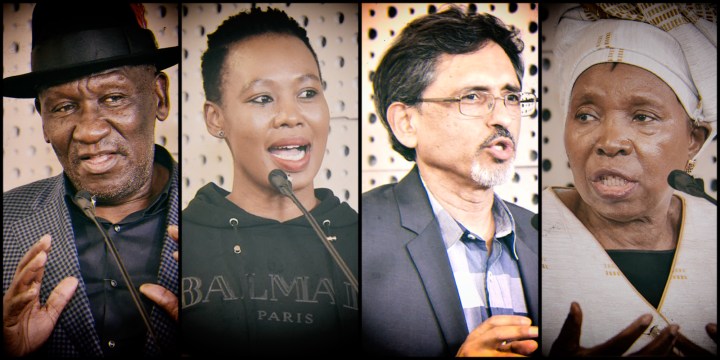CORONAVIRUS
Tracking cellphones necessary to curb Covid-19, says minister

Lockdown regulations have been amended to track the phones of people suspected to have contracted Covid-19. The amendments also allow for people to travel to funerals, centralised government control of water supplies, and for informal traders to sell food. And, no, you still can’t buy cigarettes.
Communications and Digital Technologies Minister Stella Ndabeni-Abrahams has assured the public that new regulations allowing the government to track the phones of people who have or are suspected to have Covid-19 does not amount to spying.
“I know most people have been concerned, [saying] that, ‘We can see now, government wants to spy on us’. And this is not spying on anyone,” said Ndabeni-Abrahams on Thursday evening.
She was speaking at a media briefing alongside other Cabinet members on the latest amendments to the State of Disaster regulations, which include both stricter controls of measures aimed at reducing the spread of Covid-19 and the relaxing of others.
The amendments allow the director-general of the department of health to instruct electronic communications companies to provide “the location or movements of any person known or reasonably suspected to have contracted Covid-19” from 5 March 2020 until the end of the State of Disaster.
The department can also request the location details “of any person known or reasonably suspected to have come into contact” with that person.
The department of health has complained that some people who have tested positive for Covid-19 have been difficult to trace as healthcare workers have not properly recorded their details or they have defied self-isolation and quarantine regulations.
Information collected from cellphones will be added to a national Covid-19 tracing database for officials to trace and screen those who have come into contact with someone who has contracted the virus.
“When we say we’re going to use cellphone numbers, it doesn’t mean that we take anybody’s number,” said Ndabeni-Abrahams.
“We do respect the fact that everyone has a right to privacy, but in a situation like this our individual rights do not supersede the country’s rights,” she said.
“We’re saying the most critical and important right that we’re all working towards is ensuring safety for South Africans so that the spread does not continue.”
Justice and Correctional Services Minister Ronald Lamola is required to appoint a retired judge to oversee the tracing database. The regulations stipulate that recorded information can only be shared to combat the spread of Covid-19.
Details in the tracing database must be “de-identified” or destroyed within six weeks of the end of the State of Disaster.
The amended regulations also allow people to travel between provinces to attend funerals, for informal traders to sell food, and for the government to take control of the country’s water supplies.
Co-operative Governance and Traditional Affairs Minister Nkosazana Dlamini Zuma apologised to residents worried about whether they could attend funerals during the Covid-19 lockdown and announced that immediate family members can now travel between provinces to attend burials and cremations.
Spouses, children, parents and other relations of the deceased can now apply to a magistrate or police station commander to travel for funerals and book accommodation. The limit of 50 people attending a funeral still applies.
The amendment comes after a court last week prohibited an Mpumalanga resident from travelling during the lockdown to Eastern Cape to support his mother after his grandfather died in a fire.
Dlamini Zuma clarified that all spaza shops can operate during the lockdown and informal traders can continue to sell food, but must get a permit from a councillor or a municipality.
Water provision has been a key concern in combating the spread of Covid-19 and Human Settlements, Water and Sanitation Minister Lindiwe Sisulu said water supplies under municipal and irrigation boards will be centralised under a national command centre situated at Rand Water in Johannesburg.
“In short, we are now taking over most of the work that belongs to the boards that we’ve given rights to look after water. We have centralised it. We will also centralise procurement of all of those areas that we are dealing with,” she said.
Sisulu said the government could now direct water from irrigation boards, which largely supply farmers, to areas in need during the crisis. She said irrigation boards would be compensated for the water used.
Sisulu’s department has provided thousands of water tanks and sent tankers across the country to water-scarce areas in the past week.
As the lockdown continues to be enforced, Police Minister Bheki Cele said 24,389 SAPS, metro police and SANDF members were on the streets. From the beginning of the lockdown to 31 March, 2,289 people had been arrested for violating the regulations.
Cele questioned reports suggesting authorities have been heavy-handed in enforcing the lockdown. He said the Independent Police Investigative Directorate (IPID) is still investigating three deaths allegedly linked to the police and no officers have yet been charged with murder.
IPID received 26 complaints in the first three days of the lockdown and 12 in the days since, “which means that we’re stabilising, we’re going down”, said the police minister.
Cele also warned the Western Cape government that it could not allow the sale of cigarettes, which are not included as an essential good. The provincial government said cigarettes could be purchased along with essential goods on Wednesday.
“There is no province that has got a special dispensation out of the regulations that have been signed by the national minister,” said Cele.
“If it is not on the national regulations it is not allowed to happen. The South African police, who are custodians of the laws and the national law, will have to enforce the national law.
“If that is discussed, as some people have raised it, let it be discussed, and we find (an) answer out of it. But for now, cigarettes are not sold,” said Cele. DM


















 Become an Insider
Become an Insider